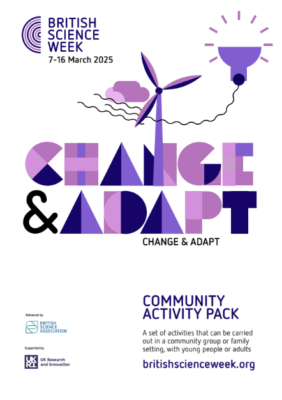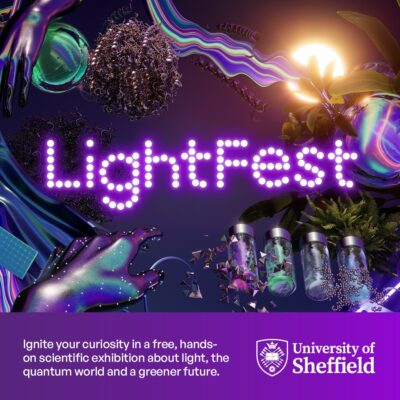British Science Week, run by the British Science Association, is a ten-day celebration of science, technology, engineering and maths (STEM)! It takes place 7 – 16 March 2025.
British Science Week is for everyone, and anyone can host, organise and participate in events. Libraries, galleries, schools and community groups are just some examples of who gets involved.
This year we have created a dedicated ‘Communities’ hub’ – where we’ll be listing some accessible and exciting ideas for community groups to kick off their British Science Week plans. So, spread the word, scroll down and get stuck in!
If you have any suggestions for this page, please do send them to [email protected] with ‘Communities hub suggestion’ in the subject line. We won’t be able to feature them all, but will pick the ones that are the most useful to community groups.
Accessible activities for all ages
Each year, free-to-download activity packs are produced to provide educators and community groups with some resources for British Science Week.
In 2022, we launched our first Community activity pack to accompany those created specifically for early years, primary and secondary aged students in school settings.
You can download *all* the Community activity packs for a heap of ideas to try out!

Events around the country
200 years of the Royal Institution Christmas Lectures!This year the Royal Institution (RI) marks the 200th anniversary of their famous Christmas Lectures, and they’re making British Science Week 2025 part of the celebrations! On Wednesday 12 March at the Institute of Physics in London, Michael Cutts of the RI will be giving a unique talk looking back at the history of the Christmas Lectures, the extraordinary ideas they covered, and how they’ve inspired generations. The talk begins at 6pm and is free and open to all, although a ticket is needed.
|  |
Southampton Science and Engineering FestivalBritish Science Week takes place this year 7-16 March and as it happens, so does the University of Southampton’s Science and Engineering Festival! There is a packed schedule of free, family-friendly “hands-on activities, workshops, talks, exhibits shows and laboratory tours”. Attending the festival will be fantastic way to celebrate the Week – exploring a university campus and hearing from a range of STEM professionals. The full programme and tickets will be available in mid-February.
|  |
Colliderfest, HullThe inaugural Colliderfest – a ‘four-day science and arts extravaganza’ will take place in Hull City Centre during British Science Week! The festival is happening 13-16 March, with Thursday 13 and Friday 14 March focusing on school events – shows, workshops and exhibitions by leading scientists. The weekend days will be perfect for families to come and enjoy interactive exhibits and live performances. Evening events will cater to older audiences. Colliderfest’s partners include University of Hull and Hull Museums and Galleries, and will showcase the scientific achievements of the area and highlight local STEM career options.
|  |
Science Lates at the Glasgow Science CentreLots of British Science Week events are for children and young people, but this one is for grown-ups only! The Glasgow Science Centre is celebrating with a special evening event – Science Lates: Forces of Change, ‘a dynamic night of discovery, drinks, and hands-on fun’. There’ll be lots of exhibits, games and workshops to get involved in, including Brain Bingo, food and special themed-cocktails. This one is strictly for over-18s, so if you’re lucky enough to look under 25 bring ID! Essential information Prices: £15 per adult, £12 concession
|  |
British Science Week at Tower BridgeBritish Science Week is coming to London’s iconic Tower Bridge! On Saturday 8 March there will be free drop in sessions at Tower Bridge from 10am-4pm for families and people of all ages. History and science will meet “where people can discover the Victorian steam engines, coal-fired boilers, and accumulators that once powered the mighty bascules of the Bridge and how they have evolved over time”. There will be lots of fun, hands-on activities that fall under to this year’s theme of ‘Change adapt’. You could assemble a 3D jigsaw to discover secrets of the Tower, enter a bridge-building competition or produce your own electricity with a hand crank generator!
|  |
LightFest, Millenium Galleries, SheffieldIgnite your curiosity this British Science Week at a free, hands-on scientific exhibition about light, the quantum world and a greener future! LightFest will introduce you to the quantum nature of light, and some of the ways that light is important in life, technology and art. Discover how plants convert sunlight into food and explore the remarkable ways that light interacts with nanostructured materials. Find out how photosynthesis inspires scientists to develop new technologies to solve the greatest challenge facing humanity today: how to live sustainably on Earth. Thursday 13 March to Sunday 16 March 2025
|  |
Tinkering WorkshopsIf you’re in or around London, Exeter, Hastings or Cambridge, join educator and author of The Tinkering Workshop Ryan Jenkins during British Science Week for tinkering masterclass! Ryan and teams at ShiftED Makerspace, Exeter Library, Mechanical Making Space in Hastings and Cambridge Science centre for free workshops exploring tinkering. ‘Tinkering is a way to learn about art science and technology that emphasizes experimentation, collaboration and playfulness. For tinkering projects there’s not a specific end-point and each design will be different depending on the questions and ideas of the learners.’ Families will build imaginative creatures and machines from the materials provided. The workshops will be taking place 6-9 March.
|  |
Smashing Stereotypes
Smashing Stereotypes is a campaign that showcases people with jobs you might not even realise are related to science, or those who have taken an non-typical path into STEM.
It also focuses on people from backgrounds underrepresented in the science workforce – if you’re interested, you can find out more about which groups are not proportionally represented in STEM in this article.
Check out the videos to delve into their journeys. This could lead to conversations about your group’s hobbies, and how you could fuse them with science in a future career!
Pearce created an AI-powered personal training app…
Natalie merges creativity and engineering to help protect our bodies against injury
Seyed’s love of gaming is transforming how we learn